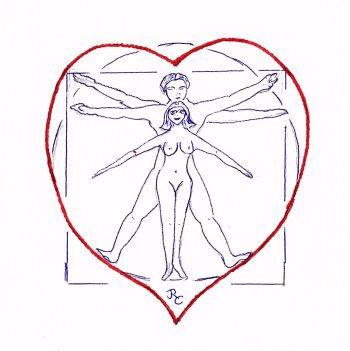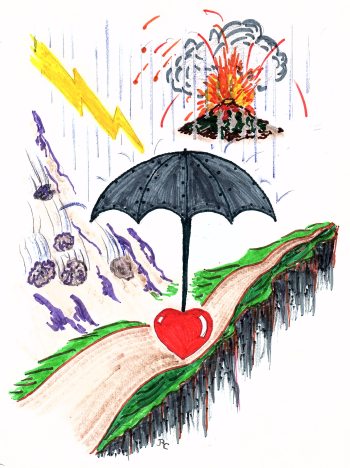Mini-Love-Lesson #256
Synopsis: How experiencing healthy, real love makes your body healthy and how giving and getting love is both healthy for you and those you are doing love with as well as bystanders; how not having love connections is unhealthy; and how living in healthful, real, love networks works best for all concerned is insightfully delved into here.
Body Thriving Love
Love is a great component for a thriving body! Mounting evidence points to the fact that we mammals are biologically hardwired to seek, make and maintain love connections with others. One way we benefit from that has to do with our physical health. Our safety, survival and better health functioning depend on connecting and especially love connecting with others.Any and all emotional connections can help but it is love connecting that we thrive on. When we are in good and healthy, getting and giving love relationships, all our body systems tend to work better. Our circulation, our blood pressure, our digestion, our immunity mechanisms, our metabolism – everything works better once we are established in ongoing, stable, healthy, real, love relationships. link Love & Survival by Dean Ornish.
Lacking Love Connections
When we do not feel love-connected to others our sense of safety tends to recede and then our physical and psychological stress mounts. That means parts of our non-conscious brain (amygdala, posterior cingulate, etc.) start sensing a threat. That triggers the release of stress hormones (adrenaline, cortisol, etc.) into our bodies. At first this can, in the short term, help us fight or flee a threat. However, in the long term, feeling threatened continuously and/or repeatedly can be very damaging to us. Prolonged stress, tension and threat can cause strokes and heart attacks, hike cancer susceptibility and bring on a host of other serious, physical health problems (see “Connection Matching – A Love Skill” and “Co-Connecting – An Essential Love Team Skill”).Psycho-neurologically, the dynamics of stress are causally linked to increasing chemical imbalances in the brain, micro brain structure damage causing cognition and emotion control problems, and other serious brain system malfunctions. These, in turn, are associated with the exacerbation or the cause of a great many different mental, emotional and behavioral problems including addictions, ultra- sensitivity to emotional hurts, hyper-reaction and over-responsiveness to anything perceived and interpreted as personally negative. All that can, and often does, lead to much interaction failure and relational dysfunction in couples, families, friendships, etc.
A new love connection or a prior love re-connection can greatly help reverse all of the above difficulties. Increases in healthy self-love with a sense of being better internally-self-connected can often do much the same (see “Wellness: Its Necessity, Healthy Real Love” and “From Self-Love to Other Love and Back Again”).
On the Positive Side
Physically, when you receive well the behaviors which trigger your brain into feeling well loved, your brain begins to reduce its production of destructive, stress hormones. That, in turn, triggers increases in your immunity functioning and disease resistance. It also helps with good digestion, sleep, reduces addictions susceptibility and relapse proneness, plus it increases your ability to heal damaged tissue. Healthy, real love in your life means you will age slower and probably live longer.Being healthfully and well loved as well as being loving creates and aids healthfulness in many ways. Essential to this process is being good at receiving love and going after the love you need and want in successful ways. With good and sufficient reception of the behaviors that trigger the brain into feeling well loved, every body process operates better. Receiving love well also usually leads to more happy, harmonious and cooperative love relating. Body-wise this means better disease resistance, regenerative tissue growth, blood pleasure balance, illness recovery, good digestive functioning, general resilience, more energy and greater likelihood of longevity (see “How Receiving Love Well Gives Love Better”).
Love Relationships – A Two-Way Thing
Living in two-way, giving and getting love filled and love cycling relationships is physically, mentally and emotionally beneficial for, not only both participants, but also for the people you jointly effect like children and other family members and dear friends. Such loving relationships benefit everybody. They produce I win, You win, Everybody wins relating patterns and networks.Love connection loss is unhealthfully stressful for all mammals, and birds too, and probably for other species as well. Likewise, insufficient and erratic love also can produce stress and resulting health problems. When we are infants, a lack of receiving the behaviors of love can physically kill us via failure to thrive syndromes. That even is true for infants who otherwise are very well taken care of minus the behaviors of love. When we are adults, love loss and loveless situations can make us more susceptible to disease, addictions, stress illnesses and suicidal depression. When we are elderly, active healthy love relating of every kind can help us live longer, healthier and happier than we otherwise would.
Living in isolation from love relating, even though surrounded by people, can be quite bad for you. Some people live lives of giving love but not getting much love, and some try it the other way too. Such people are not living in love relating networks and they benefit from love but not nearly as well as those in love networks that are really filled with both giving and getting love connections. Our bodies react very positively to living in a love relating network such as a healthfully loving family, group of close friends, comrade networks, etc.
Giving and Getting Love Both Count
A good number of studies show giving love has many of the same positive effects as getting love. Even altruistic love actions toward recipients who have no chance of returning positive behaviors is quite healthful. Love of pets (especially mammals) as well as healthy self-love actions also produce lots of healthful body reactions. Link “Self-love and Its Five Healthy Functions”Having more than one place, or person, to give your love to also is a very helpful thing to do. Giving love to more than one person, as well as receiving love from more than just one, protects against the damages of losing a one and only love source. Every love relationship you have can be an enrichment, not only to you but also to all the other love relationships you have. Consider the concept that love grows on love and love creates more love. Then there is the idea that love, like ideas, tends to increase the more you give it away.
Having a love-related-purpose in life, or a love-related-cause to pour yourself into, also can be quite useful to one’s own health and well-being, as well as to others. It is important that you choose carefully. Some people pour themselves into achievements that make no particular contribution. Then later they become quite disappointed and depressed because they realize those efforts seem meaningless.
Giving love to pets and receiving love from them (especially it seems with dogs, but also with other mammals and sometimes also with birds) has helped many people through very difficult times (see “Pet Love”).
Giving and getting love from yourself seems a bit strange and baffling to many at first. However, those who get good at it report very good results. Remember, there are two sides to the ancient adage “Love others AS you love yourself” and so, I recommend being quite active about both.
One More Thing
Will you, and perhaps others, benefit from you talking about all you have just read with other people? You might want to experiment with that idea. If so, please mention this site and all of our many mini-love-lessons and help spread some love knowledge into our love-needy world. Thanks.As always – Go and Grow with Love
Dr. J. Richard Cookerly
Love Success Question: Your body is made of many miracles so, with healthy self-love do you love, honor and respect it?





